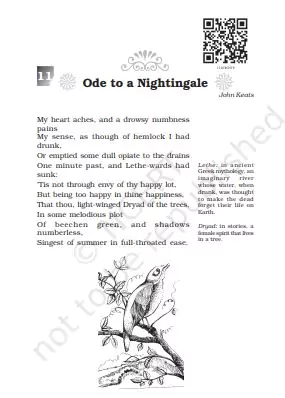‘NCERT Solutions for Class 11 English Chapter 11 Ode to a Nightingale‘ PDF Quick download link is given at the bottom of this article. You can see the PDF demo, size of the PDF, page numbers, and direct download Free PDF of ‘Ncert Class 11 English Chapter 11 Exercise Solution’ using the download button.
Ode to a Nightingale PDF Free Download

Chapter 11: Ode to a Nightingale
My heart aches, and a drowsy numbness
pains
My sense, as though of hemlock I had
drunk,
Or emptied some dull opiate to the drains
One minute past, and Lethe-wards had
sunk:
’Tis not through envy of thy happy lot,
But being too happy in thine happiness,
That thou, light-winged Dryad of the trees,
In some melodious plot
Of beechen green, and shadows
numberless,
Singest of summer in full-throated ease
O, for a draught of vintage! that hath been
Cool’d a long age in the deep-delved earth,
Tasting of Flora and the country green,
Dance, and Provencal song, and sunburnt
mirth!
O, for a beaker full of the warm South,
Full of the true, the blushful Hippocrene,
With beaded bubbles winking at the brim,
And purple-stained mouth;
That I might drink, and leave the world
unseen,
And with thee fade away into the forest
dim.
Fade far away, dissolve, and quite forget
What thou among the leaves hast never
known
The weariness, the fever, and the fret
Here, where men sit and hear each other
groan;
Where palsy shakes a few, sad, last gray
hairs,
Where youth grows pale, and spectre-thin,
and dies;
Where but to think is to be full of sorrow
And leaden-eyed despairs,
Where Beauty cannot keep her lustrous
eyes,
Or new Love pine at them beyond tomorrow.
Thou wast not born for death, immortal
Bird!
No hungry generations tread thee down;
The voice I hear this passing night was
heard
In ancient days by emperor and clown:
Perhaps the self-same song that found a
path
Through the sad heart of Ruth, when, sick
for home,
She stood in tears amid the alien corn;
The same that oft-times hath
Charm’d magic casements, opening on the
foam
Of perilous seas, in faery lands forlorn.
Forlorn! the very word is like a bell
To toll me back from thee to my sole self!
Adieu! the fancy cannot cheat so well
As she is fam’d to do, deceiving elf.
Adieu! adieu! thy plaintive anthem fades
Past the near meadows, over the still
stream,
Up the hill-side; and now ’tis buried deep
In the next valley-glades:
Was it a vision, or a waking dream?
Fled is that music:—Do I wake or sleep?
| Author | NCERT |
| Language | English |
| No. of Pages | 5 |
| PDF Size | 0.4 MB |
| Category | English |
| Source/Credits | ncert.nic.in |
NCERT Solutions Class 11 English Chapter 11 Ode to a Nightingale
1. How does the nightingale’s song plunge the poet into a state of ecstasy?
Answer:
John Keats composed this poem while sitting in his garden under a plum tree in Hampstead. The Nightingale song inspired the poet, which helped him complete the poem in a day. The poet starts the poem in a sad mood and explains how his “heart aches” as if he is drugged or poisoned.
He felt like he drank water from the Lethe and was drowsy. It is then revealed that the song of the Nightingale is the main reason for the happiness of the poet. Finally, the Nightingale is addressed by the poet that his happiness lies in the happiness of the bird.
2. What are the unpleasant aspects of the human condition that the poet wants to escape from?
Answer:
When the poet is celebrating joy in the Nightingale song, he is pushed into deeper thought. John Keats consoles the people for the unpleasantness and sorrows which one undergoes in life. The poet wants to break free from these, fly to the Nightingale and drown in the euphoria of its singing. The poet notices the truth which lies in human life and learns that the entire world can provide only momentary happiness to humans while the rest is fake and contains pain.
The materialistic profits include pain rooted within, and the poet wants to run away from all of them. He notices the different obstacles one has to go through in their life. He explains the bird, who has never gone through weariness, fever, fret; who never groans like the men where “palsy shakes a few”, those “sad” folks with few “grey hairs”, how “youth grows pale”, “spectres thin and dies” as time passes.
He laments the world where everything is temporary. The poet wants to come out from the various aspects of the world and wishes to spot the world where happiness lies, where joy awaits him.
3. What quality of ‘beauty’ and ‘love’ does the poem highlight?
Answer:
Romantics share a respect for the beauty of nature and find comfort in the embrace. The poet releases the truth in this poem, which is death. In order to fight against this inevitability, he celebrates nature’s beauty, wherein he notices the beauty in the song of the Nightingale. We all must die in the end. Keats explains about a trip from birth to death.
The poet enjoys the song of the bird and feels euphoric. The poet realises that beauty is something that lies within and not what we see. The poet dwells in the beauty of nature which helps him to delay the ultimate, which is death! Anyhow, he must die. This beauty in the song of the bird, nature would always remain, though the poet would become aged and die.
It is important to note that true happiness and beauty lies in spiritual awakening and not in this profit-minded world. In this world of momentary profits, nothing is permanent, neither love nor beauty.
NCERT Class 11 English Textbook Chapter 11 With Answer PDF Free Download
